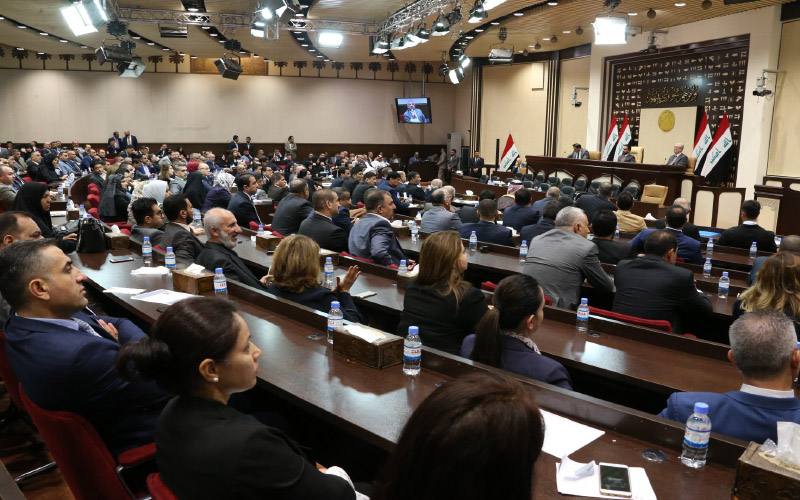Towards Reform alliance: We will not accept any candidate for prime minister who does not fit these factors

Shafaq News / The head of "Towards Reform" coalition in Diyala province, "Burhan al-Maamouri” announced on Monday that his parliamentary bloc refused to return to the first quota square, vowing not to pass any candidate for prime minister position "that is not compatible with the national constants and the sacrifices made by the demonstrators."
Al-Mamouri said in a statement today that "when the Iraqi people went out with the banner of change and reform, the first demand they called for was to end the quota system that brought the country to the brink of the abyss," noting that "this demand cannot be achieved without the real will of the political forces that respect the opinion of the masses. "
He added that "the opportunity was favorable if some political blocs abandoned the pressure on Mr. Mohammed Tawfiq Allawi and left the field in front of him to freely choose his ministry, pointing out that" insisting on sharing positions and not paying attention to the interest of the country will deepen the gap between citizens and decision makers. "
Al-Maamouri called on the protesting masses to continue their peaceful movement until the formation of a strong, independent government that fulfills their aspirations and responds to their demands, stressing: The other parliamentary bloc will continue on its national approach refusing to return to the first quota and the pledges of the people that they will not accept passing a candidate that does not fit with the national constants and the sacrifices presented by the demonstrators. "
For his part, the office of the leader of the National Coalition, Iyad Allawi said in a statement today that "a few weeks ago, the news revealed the dictates of Ali Akbar Wilaity on the honorable people of Iraq and the Iraqi Council of Representatives regarding an internal affair related to the formation of the Iraqi government and beyond, which are dictations faced and countered by the steadfastness of the Iraqi people, peaceful demonstrators, and martyrs Iraqis rejected any interference from any external party, driven by their faith in God Almighty, and their love for the homeland.
The statement pointed out that "some Iraqi political leaders stood as a victory for the Iraqi will, foremost among them was our companion, our dear brother Masoud Barzani. I thank the countries that stood with Iraq and its noble people, led by the Hashemite Kingdom of Jordan and the State of Kuwait, the two dear countries , some European countries, and the United States, which condemned the attacks on the people of Iraq and promised to punish the killers. "
The statement added that we must look forward today to everyone's participation in inflicting the maximum types of penalties against these killers, according to Iraqi law, compensating the families of the martyrs, treating the wounded, finding a solution to the problems of the displaced, compensating them, and working to bring them back to their areas, building destroyed cities, the release of detainees the end of their prosecutions, and tracking their rights, holding early elections with a fixed date by the Federal Court and the United Nations in New York, the amendment of the commission and the election law.
The statement called on "the neighbor to work on the basis of good neighborliness with Iraq and the Arab countries, to pursue the values of peaceful coexistence, and to move away from possession, and to be well aware that Iraq and the Arab countries cannot be swallowed."
Allawi had announced his withdrawal from the formation of the transitional government on Sunday after the failure of Parliament for the second time in a row to hold an extraordinary session to give confidence to his government.
The President of the Republic, Barham Ahmed Salah agreed to Allawi's withdrawal, announcing the start of his consultations to choose an alternative candidate within a period of 15 days within the scope of his responsibilities according to the permanent Iraqi constitution.
Iraq is still without a government since the resignation of former Prime Minister Adel Abdul-Mahdi, which he submitted under pressure from the supreme authority of the Shiites represented by Ayatollah Ali al-Sistani, and after the escalation of violence against protesters.
Allawi was supported by two of the largest Shiite blocs in Iraq, namely, the "Walkers" coalition called by the leader of the Sadrist movement Muqtada al-Sadr, and the "Al-Fatah" coalition led by the Secretary General of the Badr Organization, Hadi al-Amiri.
Most of the Kurdish and Sunni political forces, in addition to the popular movement in the central and southern regions of Iraq, expressed their opposition to Muhammad Allawi's assumption of the presidency of the transitional government.
The leader of the movement, Muqtada Al-Sadr and after Allawi’s apology for assigning him, issued a position in which he expressed his dissatisfaction with the failure of the parliament to give confidence to the transitional government, accusing what he called the "corrupters" of controlling the fate of Iraq.
The capital, Baghdad, and the predominantly Shiite areas in the center and south of the country have been witnessing since early October of 2019 protests calling for the removal of the ruling political parties and forces accused by the demonstrators of corruption and association with external parties, as well as the holding of early elections.